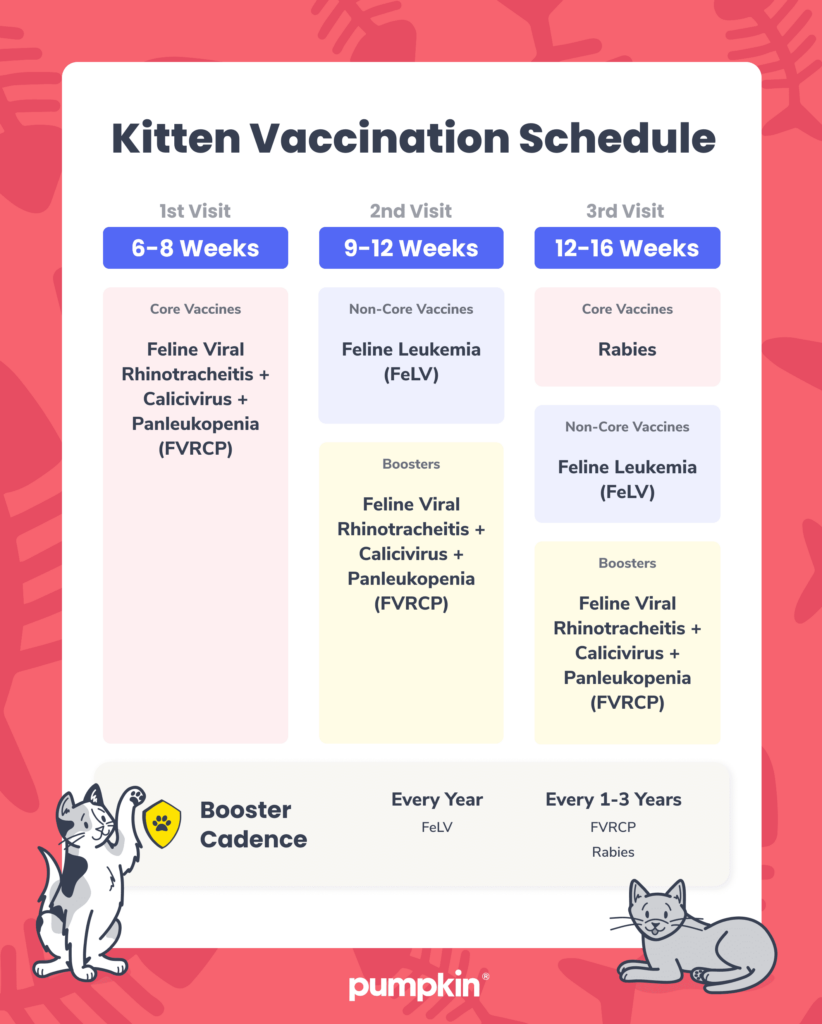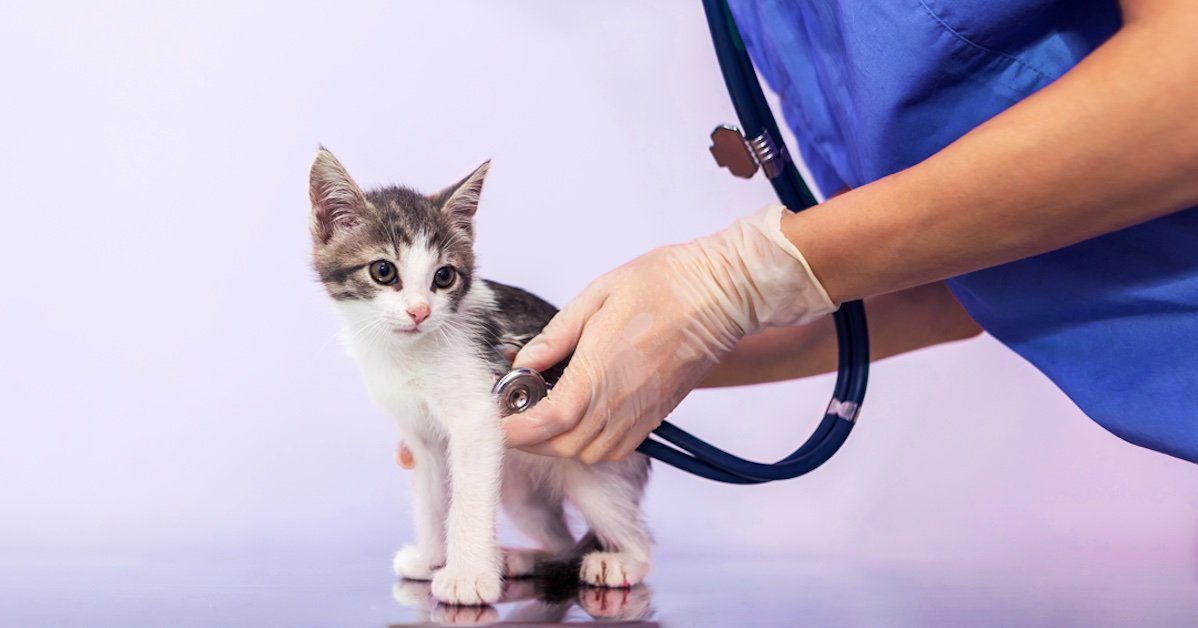Key Points
- Your new kitten should have their first vet visit within 24-48 hours after adoption. If you can go to the appointment before you take your kitten home, that’s even better.
- Tests and vaccinations are important for your kitten’s health. Many kittens will appear perfectly healthy but can harbor parasites or illnesses that could threaten your health, theirs, and any pets in your household.
- The first vet visit is the best time to ask all the questions you have about raising your new furbaby.
Kittens are adorable bundles of curiosity, hilarious antics, and warm purry cuddles. If you’re adding a new kitten to your family, a visit to the veterinarian is certainly in order!
But what can you expect at your new kitten’s first vet visit? And how do you prepare?
We’re breaking it all down here.
When should kittens have their first vet visit?
Whether you get your kitten from a breeder, a shelter, or a rescue, a vet visit within 24-72 hours after the adoption is important. Not only for your kitten’s sake but also for your family members and other pets’ health.
Tip: Ideally, you want to take your kitten to the veterinarian for their first wellness visit before you bring them home, but that’s not always possible. If you have other cats or pets in your home, keeping your new kitten in a room away from the other pets and young children is a good idea until your veterinarian has given them a clean bill of health. Provide your kitten with their own litter box, food, water bowls, and toys.
What should I ask at my kitten’s first vet visit?
The first vet visit will assess your kitten’s overall health, and it’s also a great time to ask your veterinarian all of your burning kitty questions like:
- How to kitten-proof your home
- Which cat food is best
- How to introduce your kitten to your cat and family members
- How to socialize your kitten
- Litter box training tips and tricks
- How often you should take your cat to the vet
- When your cat will stop growing
- How to promote your kitten’s health through feline enrichment
And much, much more!
What happens at a kitten’s first vet visit?
Preparing for your vet visit
Before heading to your appointment, be sure to pack any paperwork you’ve received during your adoption process. Most rescues, shelters, and breeders give kittens and puppies some parasite control medications, initial kitten vaccinations, and flea treatments. Depending on their age, they may have even spayed or neutered your kitten. This is information your vet will want to know.
It’s also important to have a cat carrier to transport your kitten to the vet’s office. There are bound to be lots of unfamiliar sights and sounds in the waiting room, and your kitten may be frightened. Having a carrier will create a safe barrier for these first-time encounters.
Tip: You may have some paperwork to complete before your appointment, so be sure to get to the vet’s office a little early. Many vets even have websites with downloadable or online forms you can fill out ahead of time.
In the examination room
A veterinary technician is most likely the first person your kitten will meet. Technicians are certified in veterinary care and document the primary assessment information about your kitten. That information will include any paperwork and information you have about your kitten, taking vital signs of temperature, heart rate, weight, lung sounds, and general observations of your kitten’s health status.
They may ask you about other information concerning your kitten’s health history such as:
- Diet: Know the specific brand and product you feed (you can take a picture of the bag), food form (wet or dry), amount and frequency of feedings.
- Environment: Are there any other pets in the home, and are they vaccinated? Will your kitten be an indoor, an outdoor cat, or a blend of both?
- Travel: Did you get your cat from an out-of-state breeder? Was air travel or ground travel used?
- Medications and treatments: This should be on any paperwork you received during the adoption process. If you don’t have any information on your kitten, your vet will want to know this as well
- Set up vaccination schedule: Setting appointments up ahead of time ensures your kitten won’t miss any vaccinations or treatments when they are due.
Tip: Kittens often carry intestinal parasites, even if they seem totally healthy, which is why vets test all kittens for parasites by running tests on stool samples. You can either bring a fresh stool sample from home with you, or a vet tech will get one from your kitten. The sample should be less than 24 hours old.
The veterinary examination
Once all the initial information is complete, your veterinarian will come in to meet you and your kitten. After confirming medical records with you, they’ll begin a physical examination of your kitty. Vets will typically inspect:
- Heart and lungs: To check for normal rhythm and clear airflow. Sneezing or coughing could mean there is a respiratory infection that needs treatment.
- Eyes: To ensure they’re clear and bright with no tearing or excess secretions that may show infection.
- Ears: To ensure they’re clean, with no dark, dirt-like debris indicating ear mites (these are common in kittens). A swab sample from the ears checks for microscopic mites as well.
- Body examination: To check for swollen lymph nodes, injury, evidence of fleas, and the condition of their fur and skin.
- Mouth and teeth: To check out their baby teeth and examine the condition of the tongue and the roof of the mouth for ulcerations or infection.
- Mobility: To check for abnormalities in the joints and normal range of motion. They may watch your kitten walk to make sure all joints, muscles, and ligaments are working properly.
Blood work and lab tests
Your veterinarian may also perform any necessary blood work and lab tests. These can include:
SNAP combo FeLV/FIV test
The American Association of Feline Practitioners recommends that any new cat of any age, or kittens who live with cats of unknown exposure, receive testing for FeLV and FIV. This test looks for the antibodies and antigens associated with Feline Leukemia Virus and Feline Immunodeficiency Virus.
Tip: Kittens can contract the disease from mother cats through the placenta and colostrum. Young kittens may test a false negative and need retesting at an older age. Your veterinarian will decide the best course of action for your kitten.
Complete Blood Count (CBC)
This test indicates any signs of anemia, hydration levels, inflammation of infection, and general organ functions.
Fecal analysis
Testing the fecal matter of your kitten can detect intestinal parasites like hookworms, roundworms, whipworms, giardia, or coccidia.
Tip: Heartworms live in the heart and pulmonary arteries. A fecal test cannot detect them and requires a separate blood test.
If worms are present in the fecal analysis, your kitten will need de-worming medications. Your vet may also recommend flea and tick control medications.
Core vaccinations
Kittens need a series of core vaccinations to protect them against some serious cat diseases. According to the most recent guidelines for feline vaccinations from the American Animal Hospital Association (AAHA) and the American Association of Feline Practitioners (AAFP), recommended core vaccines include:
- Feline herpesvirus (FHV-1)
- Feline calicivirus (FCV)
- Feline panleukopenia (FPV)
- Feline leukemia (FeLV)
Many states require rabies vaccinations as well. Kittens would ideally receive them at 14-16 weeks of age.
Tip: Pumpkin Preventive Essentials can help pay for vital routine care such as vaccines, annual check-ups, and parasite screenings. Though not insurance, this optional add-on wellness package can help you give your kitten the care they need.

Microchips
Microchips carry contact information about your kitten in the event that they escape or become lost. Any vet, shelter, or rescue can scan the chip to return your kitten to their rightful owner. Microchipping your kitten is a brilliant way to increase their chances of being returned home safely should anything happen – and your kitten’s first vet visit is the perfect time to do it! Alternatively, you can choose to have them microchipped when they are asleep for a spay/neuter surgery.
Schedule ahead for future checkups
Scheduling your kitten’s vaccination schedule, treatments, and spaying or neutering can happen at the initial vet visit. Having all the appointments scheduled reduces the likelihood of missing a specific vaccination interval or treatment for your kitten.
Taking your kitten to their first vet visit is the first step towards a happy and healthy life together. Remember to take notes, ask lots of questions, and know that you are going to be great at this cat parenting thing! We just know it.
No matter how proactive we are about our kitten’s health, sometimes accidents and illnesses happen. If they do, having pet insurance coverage can help you get the care your kitty needs. Get a quote from Pumpkin today – we’ll fetch it for free!




